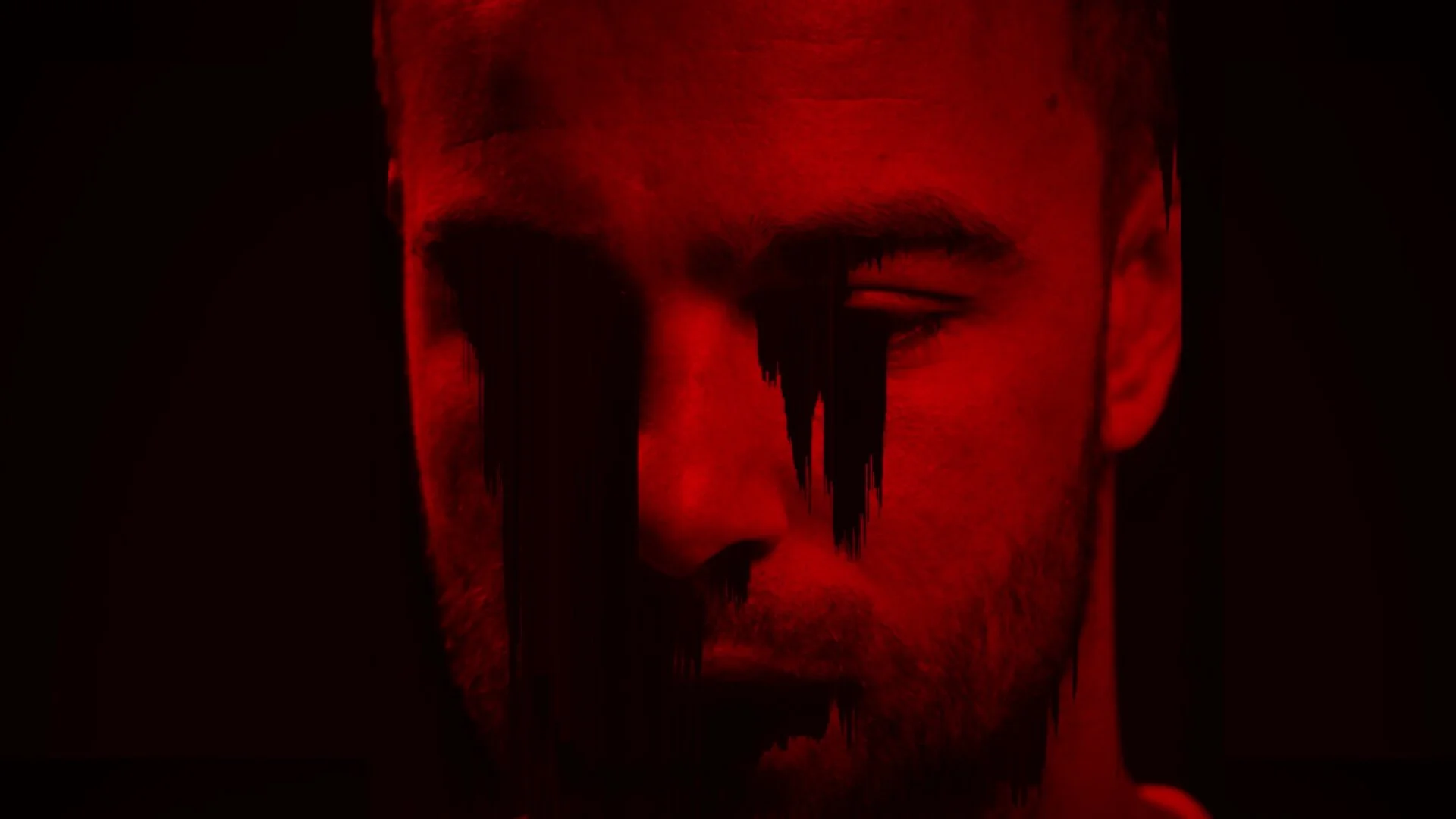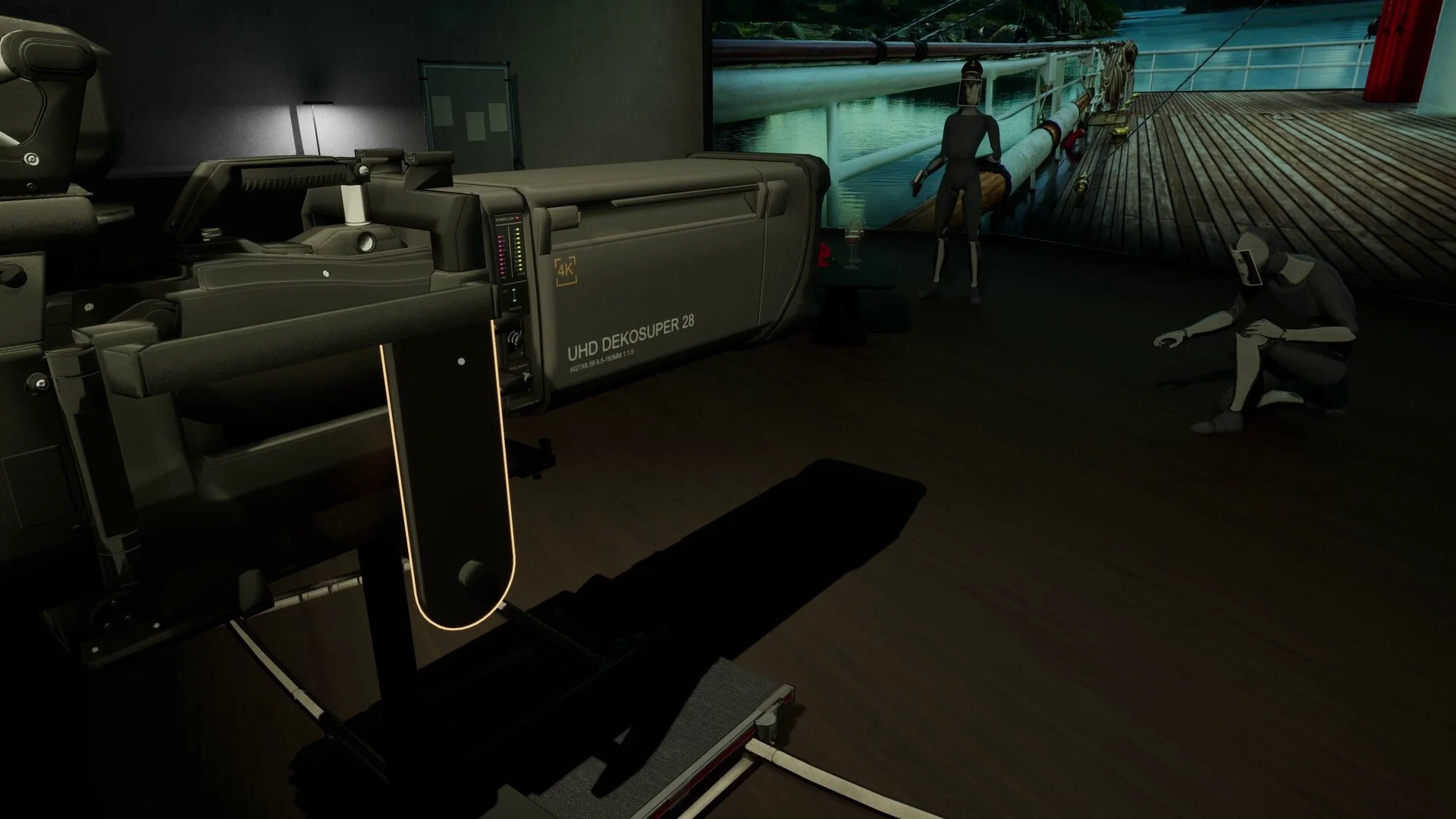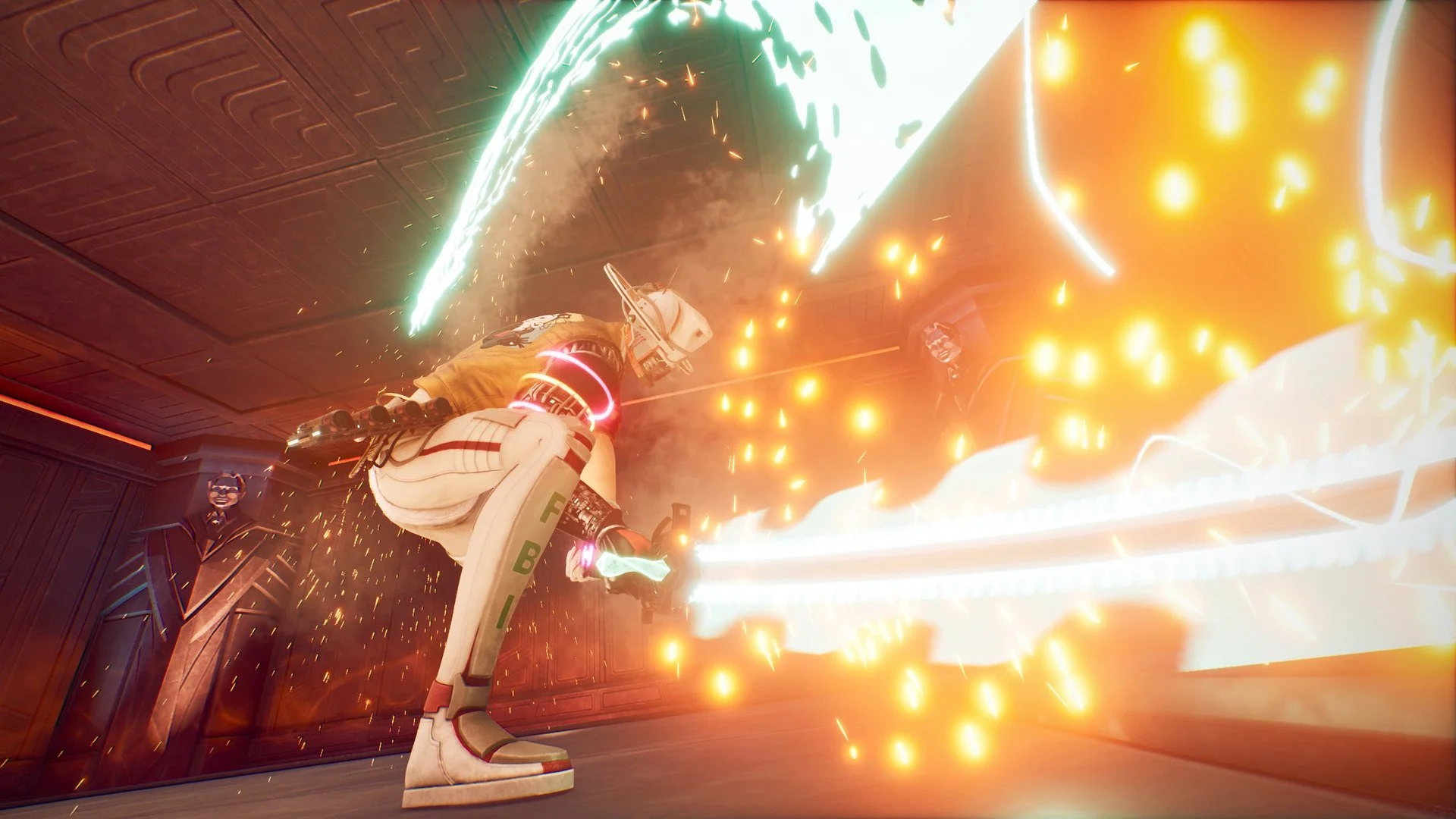Review | Dead Take - Power Is A Man’s Best Friend
It's not a secret that the film industry is a toxic and dangerous place, but Dead Take makes sure you realise just how far people are willing to go to get what they want. On the surface, it reads as a generic horror. However, when you peel back the layers and hear more frenzied rambles from an unhinged big-shot executive producer, you begin to catch on to the harsh reality of the situation.
While Dead Take didn’t really give me the experience I was hoping for, it did touch on some important topics, especially for those in the creative industries. Coming from a family of creatives, the overall plot did resonate with me, but I found that the scares and actual horror elements of the game felt cheap. However, when considering that Dead Take was developed in such a short space of time by Surgent Studios, I took on a different mindset, one that was kinder to the game and the experience it gave me. I don’t feel as critical now, knowing that it was created in under a year. With this information in mind, the story was fleshed out enough for it to make sense, but the side stories felt like they needed to be dialed back.
Although the game fell short in some areas, I was still impressed with what it had to offer and the important message of how people have to fight even their dear friends to try and get their break into the film industry, and that some people will stop at nothing to ensure that they are successful, even if it means burning bridges along the way.
In Dead Take, you take up the role of actor Chase Lowry (Neil Newbon). Vinny (Ben Starr), your fellow actor friend, attended a huge party hosted by Duke Cain (surprisingly, an uncredited role), a prestigious executive producer. However, Vinny isn’t answering his phone, so Chase goes to Duke’s mansion to try to find him.
Unlocking the gate and stepping into Duke’s grandiose mansion the following day, Chase is greeted by silence, despite the fact that a party supposedly took place the night before. The floors are covered in streamers, with wine glasses scattered everywhere. It seems normal on the surface, but crawling slowly through the house, I find otherwise.
The walking simulator elements and the overall story reminded me of Layers of Fear 2, where an actor travels through a haunted ocean liner. The mansion oozed the feeling that its owner is an unrepentant egotist, and as I progressed through the game, that became increasingly obvious. Although a lot of Dead Take felt generic, I did love the way it incorporated the use of full-motion video to unveil more information about key characters. It helped elevate the tension between the characters in conversations, even more so when the SPLAICE feature was utilised (the oddly-spelled word isn’t a typo, but a portmanteau of “splice” and “AI”).
Despite the game’s relatively short runtime of four hours, it still packed in a lot of content. In some places, it felt like there was too much going on, with small stories distracting from the game’s intended message Side content is found on optional media drives that you can discover through exploration, where characters like Victoria Cross (Alanah Pearce) and Lia Cain (Jane Perry) have their own FMV moments that dive into their personalities. Admittedly, I didn’t find all of them, so I missed out on some of the side stories. Even so, I still feel that with the few optional flash drives I did find, the information wasn’t necessary, and didn’t really add anything to the plot.
Eerily Quiet
I am someone with a nervous disposition, and I found myself jumping at even the slightest noise while playing Dead Take. When it was quiet, the air was thick with suspense. Every little noise or movement startled me. However, as the game progressed, it started to fall into too many stereotypical tropes in the horror genre for me to be impressed.
While the game is good at lulling you into a false sense of security and then ripping away the safety blanket, the scares were very typical and reminded me of other horror games I'd played. For example, short flashes of FMV footage of Vinny screaming randomly appear, at times triggered by walking into a specific room or picking up an item.
For a large portion of the game, silence is at the fore. However, certain rooms have specific sounds that are immediately unsettling. Walking into the Shield Bedroom filled me with dread, as I began to hear a baby monitor emitting the sounds of a fussy baby. Although babies going missing or being killed for whatever reason is a very common horror trope, it’s one of the few that will always put me on edge. To stop the noise, you must figure out how to “soothe” the baby, after which the monitor reveals a blood-soaked crib, as well as another clue to an in-game puzzle.
I was expecting Dead Take to be more of a puzzle game, with lots of documents and notes littered around to discover. While this was still an active part of the game, there weren't as many puzzles as I was hoping for, and they were all very easy to solve. Finding codes to open doors is easy, such as the key code to the Projector Room, where you are given a hint that the code is the date on Mrs. Cain’s caricature.
One of my favourite puzzles was the one in the Spa. There are three separate rooms within the Spa, each with its own puzzles to solve, which reward you with pieces of Poseidon’s trident. The most interesting element was the small snake puzzle, where you had to locate four weapons to slot into the right place. While it was fun to collect the weapons and read a poem that was revealed, the puzzle was very bare bones. There wasn’t much thinking needed, as you were told directly where each weapon needed to go.
Considering Dead Take is a walking simulator, it makes sense that the puzzles are not particularly difficult. On the one hand, I'm glad that the puzzles were accessible and easy for people who may struggle, but I also wanted a challenge, the same way the Silent Hill games provide.
You’re A Star!
For me, Neil Newbon and Ben Starr’s performances in the FMV segments, as well as the voicemails from the character Duke Cain (who is not listed in the end-game credits), carried this game more than the story as written. The anger and desperation portrayed by Newbon and Starr, respectively, felt real and candid, adding a poignancy to the story that it may not have had if the game didn’t utilise live-action footage. While I think it would have been interesting to see Duke in the FMV segments, restricting his presence to a disembodied voice adds a foreboding element to his character. To me, Duke was an oppressive entity from the start, somewhat similar to that of President Snow from The Hunger Games.
Dead Take features a lot of typical tropes that I’ve seen in plenty of other horror games and films over the years. From a doting mother having her world turned upside down after her child dies to an abusive husband who is too deep into his work, along with the overall air of corruption in every corner, it felt all too familiar.
While the game does dive into the important topic of how corrupt the film industry is, it felt very generic at the same time. I’ve seen stories like this in Layers of Fear 2, Visage, and P.T., to name a few. On top of that, the game’s story had a lot of plot holes and points where it could have been more fleshed out. The game features a lot of branching stories about its characters, and while it’s very clear in the main story what the plot is, the side stories don’t explain much and don’t provide anything beneficial to the overall story.
One of the most baffling things to me that I still don’t understand is the text messages Chase receives from an anonymous sender. For example, I’d get texts such as “Zara Good TEETH” or “Vinny Monroe THE TRUTH”. Even after completing the game, I am still unsure what these messages meant, or whether they were necessary to solve something that I may have missed.
One of the most skin-crawling parts of the game was listening to Duke talk to his various colleagues and actors that he was trying to employ. He was smooth and persuasive, but could very quickly become sharp as a blade, with cutting words and harsh statements that would make any person question themselves. He held his wife with such disregard and was so blasé about his son's passing that it was downright nauseating.
While Starr and Newbon put on phenomenal performances, the oozing sleaze from Duke was what helped make the story work, especially when you compare it to the real world of film and TV, where new stories are always coming out about staff mistreatment and assault. His performance left me with a similar discomfort, and I felt like I needed to wash off his words after listening to his countless voice notes, which appear automatically as you progress through the game.
Duke’s messages to Chase seem to be trying to instil him with a false sense of security. He tells him how good he’d be as the main role in his next production, all while Vinny has already been cast. Though Duke is intent on playing mind games, his true personality is revealed through some of the footage available on the media drives, where he blows up at Vinny for a ringing phone during a casting call.
Although the beginning of the game felt muddled and weak, taking too long to add significance to the story throughout the main body of the game, the plot does begin to come together towards the very end, which caused me to take a step back to really think about what Dead Take is trying to convey. The atmosphere throughout the game really helps bring it all together, such as the heavy silence that weighs down on you as you walk through the mansion, to the sounds of a baby crying and a mother sobbing. I was enthralled by the last hour of the game. Everything accelerated at a fast pace, and I couldn’t have expected what happened at the end.
Chop and Change
One of the most interesting gameplay mechanics was the SPLAICE feature. In a brief voicemail from an unidentified man, it’s explained that SPLAICE is a top-notch AI feature that Duke has exclusive access to. Through trial and error, I could combine footage I found on media drives to make new, unseen footage that revealed more information about the various names and headshots found throughout the mansion. While I was hoping for more of an interactive feature, I still admit that it was fascinating and made for some unique moments.
Watching the footage for the first time provides one perspective, but then combining it with another can turn that on its head and allow you to see it in a completely different light again. Although I wanted more from the feature, the last few combinations of footage are incredibly powerful, and bring Duke’s wife, Lia Cain, to the forefront to explain her feelings, how she copes in the industry, and how it feels being married to someone of such prestige.
I would have liked to have seen more of Lia’s personality and what she could have offered aside from being a grieving parent. The footage shown of her portrays her as something different — bitter, confident, and with an underlying anger.
Once I realised that the game was developed and released in a short period of time, it made sense that the feature was relatively straightforward, and it added purpose to the game that may not have been found in other areas. While it’s typically the case in a walking simulator that there are limited things to interact with, this was far from the case in Dead Take. There were media flash drives hidden around every corner, and in some cases, multiple combinations for the footage. So, while the SPLAICE mechanic is relatively simple, there’s plenty of material to play with.
Overall, Dead Take was a fascinating experience, but it still felt as if it lacked just a little something. The anonymous text messages with the names of the other stars that Duke was connected to didn’t quite make sense, and the side stories didn’t seem to bear any relevance, except for Lia Cain’s footage.
Ultimately, the game tells a story of power misuse, abuse, and betrayal. From manipulating the actors to believe they are going to be on top, to getting friends to turn on each other and commit horrifying crimes, it’s certainly a story that is going to stay with me for a while.










